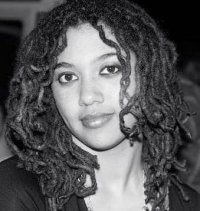Poet Bianca Spriggs opens KFTC annual meeting

Affrilachian poet Bianca Spriggs opened KFTC’s annual meeting by sharing her work and talking with participants about the meaning of collaboration.
“I have been aware of KFTC since I was 18 years old and a freshman at Transylvania University,” said the Lexington-based poet. Spriggs said college was also when she discovered poetry.
She described two projects in which she has collaborated to give voice to women: The SwallowTale Project, a writing workshop with incarcerated women, and The Thirteen, a multimedia narrative about women who were lynched in Kentucky during post-Reconstruction.
Much of her work, Spriggs said, has been about excavating the complex back stories of black women in Kentucky.
Around 200 KFTC members gathered Friday, August 22, at General Butler State Park in Carrollton to spend the weekend discussing leadership development, grassroots organizing, collaboration, Kentucky issues and more. In between workshops, participants will visit, get reacquainted, enjoy the park and honor each other with awards for shared work.
Through the SwallowTale Project, Spriggs and her collaborators helped incarcerated women in Fayette County find their voices.
“Even in the most overwhelming of confines, everyone has a story to tell and it’s their right to tell it,” she told KFTC members.
The Thirteen is a narrative that attempts to give voice to 13 women and girls who were lynched or otherwise violently murdered in Kentucky between 1870 and 1908. “The dead remain among the living like drifters,” Spriggs said.
The Thirteen, which will be reprised for one night only on March 19, 2015, at Centre College, combines spoken word, music and a full gallery exhibition.
Following her presentation, Briggs talked with KFTC members about the creative process, collaboration and the responsibility of artists.
KFTC member Tanya Torp asked what is the artist’s responsibility outside of making art.
“I think every artist has a responsibility to not just notice but not ignore what they see when they see it,” Spriggs said. Artists can attend, organize and “hopefully find a way that their art can somehow contribute to that.”
Collaboration, Spriggs said, means learning humility. “There’s always something I can learn. Everybody is a teacher. … The person sitting in front of you is someone you can learn something from.”
Recent News
Kentucky’s past legislative session showed alarming trend toward government secrecy
Churchill Downs takes more than it gives. That's why the Kentucky Derby is a no-go for me
‘We must never forget.’ Kentucky town installs markers for lynching victims.
Featured Posts
TJC Rolling Out The Vote Tour – a KFTC Reflection Essay
KFTC Voter Empowerment Contractor Reflection Essay
Voting is Power
Archives
- Home
- |
- Sitemap
- |
- Get Involved
- |
- Privacy Policy
- |
- Press
- |
- About
- |
- Bill Tracker
- |
- Contact
- |
- Links
- |
- RSS

